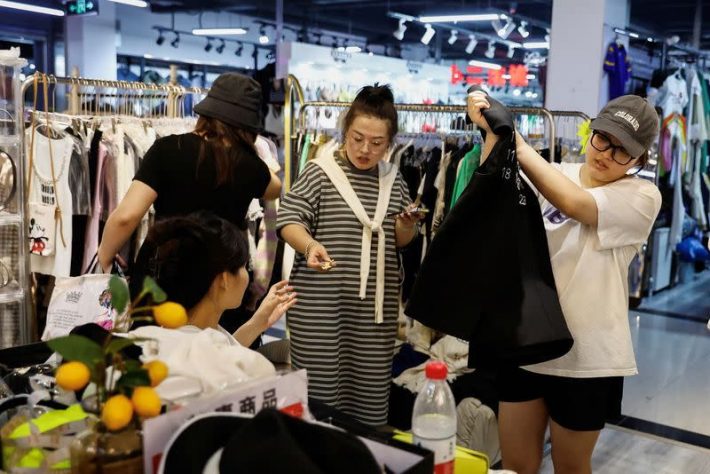China plans to issue special sovereign bonds worth about 2 trillion yuan ($284.4 billion) this year, two sources revealed on Thursday.
The move is part of a string of stimulus measures to counter deflationary pressure and faltering economic growth, sources with knowledge of the matter told Reuters.
It comes after a Politburo meeting led by President Xi Jinping in which leaders made a commitment to support the private economy and stabilize the property sector.
ALSO SEE: Russia Secretly Building War Drones in China, EU Intel Says
The meeting emphasized the need to help enterprises overcome challenges and maintain fiscal spending amid a declining economy, according to the South China Morning Post.
“Officials were urged to confront difficulties and boost confidence while avoiding complacency in their economic efforts. The meeting’s strong messaging aims to prevent further economic downturns,” it said.
As part of the fiscal package, the Ministry of Finance (MOF) plans to issue 1 trillion yuan of special sovereign debt primarily to stimulate consumption amid growing concerns about a stuttering post-Covid recovery.
Part of the MOF proceeds raised via special bonds, which are floated for a specific purpose, will be used to increase subsidies for the trade-in and renewal of consumer goods and for the upgrade of large-scale business equipment, the sources said.
Support for families, local governments
The proceeds will also be used to provide a monthly allowance of about 800 yuan, or $114, per child to all households with two or more children, excluding the first child, the first source said. That move is an incentive to bolster the declining birthrate.
China also aims to raise another 1 trillion yuan via a separate special sovereign debt issuance and plans to use the proceeds to help local governments tackle their debt problems, the source added.
Most of China’s fiscal stimulus still goes into investment, but returns are dwindling and the spending has saddled local governments with $13 trillion in debt. China’s household spending is less than 40% of GDP, some 20 percentage points below the global average.
Some of the fiscal support measures could be unveiled as soon as this week, said the sources, who declined to be named as they were not authorised to speak to media.
China’s State Council Information Office, which handles media queries on behalf of the government, and the MOF did not immediately respond to requests for comment.
Chinese leaders pledged on Thursday to push to hit the 2024 economic growth target of roughly 5% and stop declines in the housing market, state media reported, citing a Politburo meeting.
‘Taking deflation seriously’
The Politburo said the country would make good use of its ultra-long special sovereign bonds and local government special bonds to support government investment and necessary fiscal spending should be guaranteed.
The planned fiscal expansion is the latest attempt by Chinese policymakers to revive an economy grappling with deflationary pressures and in danger of missing this year’s growth target due to a sharp property downturn and frail consumer confidence.
It would also come after the central bank on Tuesday announced broader-than-expected monetary stimulus and property market support measures to restore confidence in the economy with key measures including liquidity injections and lower borrowing costs.
The measures have lifted market sentiment, but mainly because they raised expectations authorities will follow soon with a fiscal package to complement the monetary and financial measures.
Under the guidance of the top leadership, the MOF, along with several government bodies, has in recent weeks been working on fiscal stimulus measures to revive the economy, the two sources said.
In addition to the special sovereign debt issuance to support consumption, Chinese authorities also plan to ramp up financial support for small and medium-sized enterprises in phases, such as employment subsidies and tax and fee relief, to reduce their operating costs, the second source said.
“We expect more fiscal support for housing and social welfare spending in the next few months. In our view, it’s not a ‘whatever it takes’ moment, but it definitely shows that Beijing is taking deflation seriously and exploring all options,” Morgan Stanley economists led by Robin Xing said in a research note on Thursday.
Support for big banks also being considered
China is also reported to be considering the injection up to 1 trillion yuan of capital into its biggest state banks to increase their capacity to support the struggling economy, primarily by issuing new special sovereign bonds.
Analysts said the country’s top banks would need to be capitalised at the earliest to help them boost lending to revive faltering growth and manage asset quality strains.
Chinese banks’ profitability, which has already been under pressure due to the economic slowdown and property sector crisis, is set to take another hit by a further reduction in mortgage rates announced on Tuesday.
While the top banks are likely to lower deposit rates to cushion the impact on their margins, analysts said they would need fresh capital injection to offset growing asset quality woes and, potentially, bail out smaller peers.
China’s big state-owned banks are generally tapped to rescue the struggling small and mid-sized lenders, many of whom reel from lower capital buffers, poor asset quality, and fewer sources of raising fresh capital.
China’s four biggest banks, including Agricultural Bank of China and Bank of China, needed 738 billion yuan ($105 billion) of total loss-absorption capacity (TLAC) capital as of end-June, according to S&P Global Ratings.
- Reuters with additional input and editing by Jim Pollard
NOTE: Further details were added to the text on September 26, 2024.
ALSO SEE:
China Economist Detained ‘After Xi’s Falling Out With Liu He’
China Central Bank Stimulus Moves ‘Broad But Underwhelming’
China’s PBOC Cuts Short-Term Rate, to Discuss Outlook Tuesday
US May Sanction China’s DRAM Chip Giants Next, Analyst Warns
Big US Banks Cut China Growth Outlook Amid Industrial Slowdown
China’s Local Governments Slow to Act on Property Crisis
China to Use Bonds to Pay For Consumer Trade-in Scheme
China’s Population Drops Again, Economic Fallout Fears
























